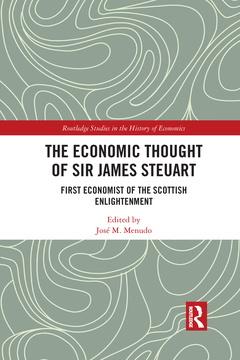The Economic Thought of Sir James Steuart First Economist of the Scottish Enlightenment Routledge Studies in the History of Economics Series
Coordonnateur : Menudo José M.

James Steuart published An Inquiry into the Principles of Political Œconomy in 1767, the first systematic treatise on economics, nine years before Adam Smith?s Wealth of Nations. Traditional historiography has tended to disregard and even deny Steuart?s oeuvre, categorizing him as the last, outdated advocate of mercantilist policies in Britain.
A clear portrait of a modernizing and enlightened Steuart emerges from this book, opening up an alternative approach to many key developments in economic theory. This book brings together a diverse international team of experts to overturn the "advocate of mercantilism" myth and explore different interpretations of Steuart?s work within the context of the writings of other contemporary authors. A diverse range of specialists ? historians, economists, political scientist, and sociologists ? reflecting the diversity of James Steuart?s work explore various aspects of the life, works, and influence of James Steuart, including his links to other authors who conceive ? as Steuart did ? the economic system of "natural liberty" as an artificial creation. The portrait of a demarginalized, modernizing, and enlightened Steuart emerges clearly in this book.
This book is not reduced to old authors whose ideas would be at the Museum of Dead Ideas, it has a very contemporary resonance. The subjects and the way Steuart tackles them could have a big influence on future authors who recognized some advantages of an alternative approach to many key developments in economic theory. This will also be of interest to scholars of history of economic thought, intellectual history, and 18th century history.
Foreword Ramón Tortajada
Part I: A Society Without Invisible Hands
1. James Steuart on the Public Good Christopher J. Berry
2. The Sociogenesis of the Modern State in Sir James Steuart’s Principles of Political Economy Matari Pierre Manigat
3. James Steuart: Slavery and Commercial Society in his Principles of Political EconomySimona Pisanelli
4. Beyond Montesquieu: Scottish Institutional Legal Thought and Steuart’s Spirit of the People Aida Ramos
5. The Notion of Political Economy in Steuart's and Smith's Main Works Francis Clavé
Part II: Money, Prices, and Production
6. James Steuart on John Law’s System: The Beginnings of a Rational Monetary Analysis? Jean Cartelier
7. ‘Writings on Money Full of Instruction’: Steuart and Ricardo as two squabbling bedfellows Ghislain Deleplace
8. James Steuart: A Modern Approach to the Liquidity and Solvency of Public Debt Nesrine Bentemessek and Rebeca Gomez Betancourt
9. Steuart’s Naïve Theory of Money and Credit: A Macroeconomic Perspective Shigeki Tomo
10. Determination of Prices in the Economic Theory of James Steuart From a Modern Classical PerspectiveAlexander Tobon
Part III: Readers and Readings of James Steuart
11. James Steuart Versus Adam Smith: Tempest in a Teapot? Eyüp Özveren
12. Steuart and Davenant on Financing Wars Yutaka Furuya
13. Steuart, A Late Mercantilist? Mauricio C. Coutinho
14. Steuart, Hegel, Chamley: A Case Upon the Nature of ‘Influence’Gilles Campagnolo
15. Giovanni Tamassia and the Early Italian Reception of Steuart’s Principles of Political Economy Cecilia Carnino
José M. Menudo is Professor of History of Economic Analysis at Pablo de Olavide University, Spain.
Date de parution : 06-2021
15.6x23.4 cm
Date de parution : 10-2019
15.6x23.4 cm
Thèmes de The Economic Thought of Sir James Steuart :
Mots-clés :
Book III; Public Administration; James Steuart; Monetary Unit; political economy; South Sea Bubble; history of economic thought; Steuart’s Principles; mercantilism; Steuart’s Work; mercantilist; Steuart’s Analysis; monetary theory; Undebased Coin; theory of money; Steuart’s View; invisible hand; Steuart’s Theory; enlightenment; Political Oeconomy; Scottish enlightenment; Steuart’s Book; intellectual history; Steuart’s Inquiry; neo-mercantilism; Public Debt Bonds; natural liberty; Civil Society; international trade; Solid Property; economic development; Symbolical Money; Public Creditors; Monied Interest; Double Competition; Mercantile System; Italian Authors; Sinking Fund; Viability Kernel; Gold Bullion



